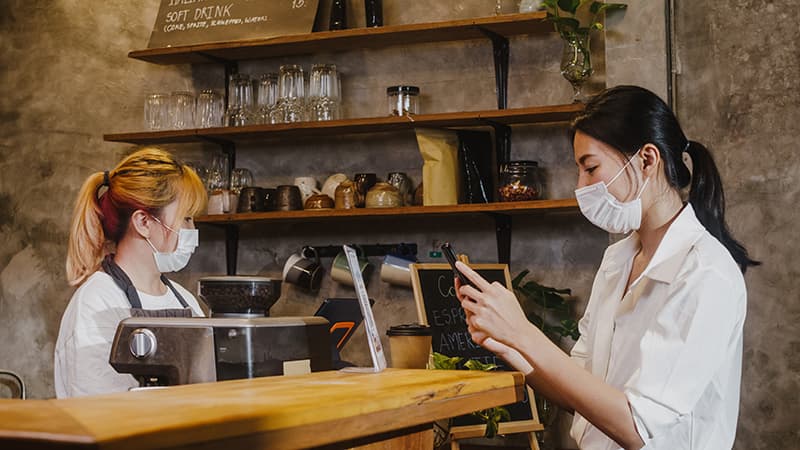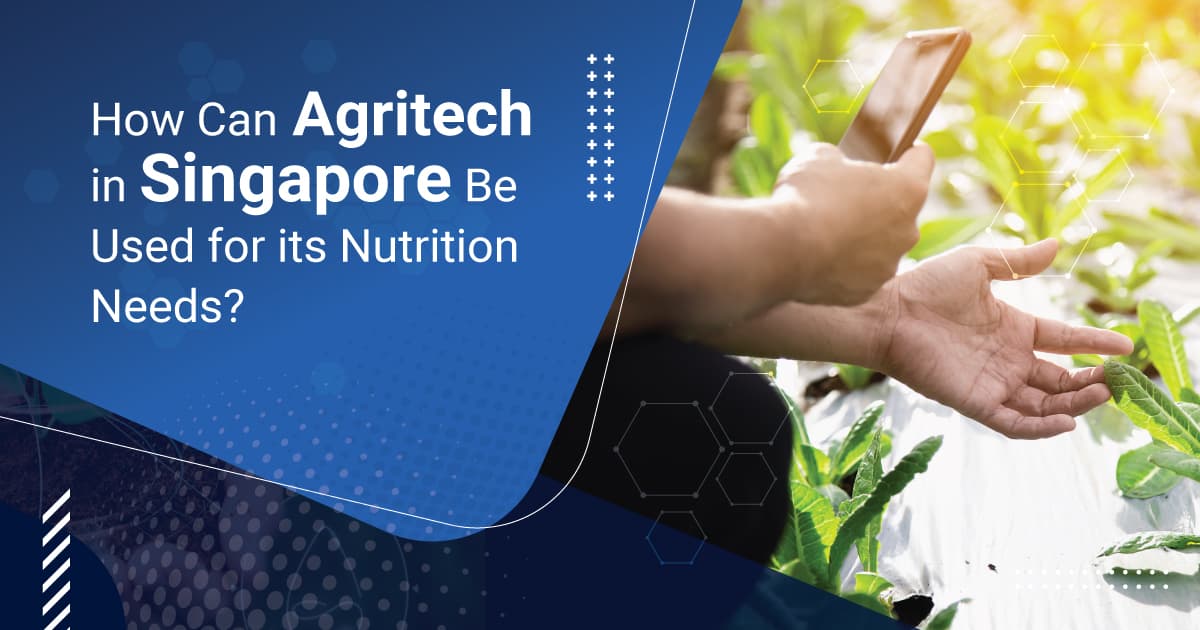Inside the Content
- What Are the Reasons for Food Supply Disruptions?
- What Are the Food Trends That Will Affect Singapore?
- What Has Singapore Been Doing to Solve Its Food Problems?
- How Can Agritech Help Singapore With its Food Security Problem?
- What Are Some Agritech Initiatives in Singapore?
- What Are Some Singapore-Based Startups to Watch?
Singapore has been battered by food supply disruptions from all around the world, driven by external factors.
As a food importer, it imports more than 90% of its food from more than 170 countries and regions. Although this has worked well for the country, it also makes it vulnerable to new trends.
For example, some governments, facing pressure, have taken unusual measures, like banning exports of their products.
In this article, we explore the different reasons causing food shortages worldwide, and how agritech in Singapore can help the nation manage its food reliance problem.
What Are the Reasons for Food Supply Disruptions?
There are a few causes of the global food supply disruptions that have affected Singapore. They include:
The Onset of COVID-19
COVID-19 has raised food prices and decimated incomes, but that is not all. International food prices began to hike in mid-2020 when firms stopped operations due to the pandemic, straining supply chains.
Problems With Food Crops
Since COVID-19, troubles have also plagued parts of the world’s food exporters, including:
- China’s terrible wheat crop
- Top soybean exporter Brazil suffering from serious drought
- Bird flu in Europe and North America affecting prices of eggs and poultry
The Ukraine-Russian War
The ongoing conflict between Russia and Ukraine has been a huge driving factor for inflation and supply chain disruptions worldwide.
It has also pushed up the prices of different products, including feed ingredients. This means that it has become much more costly for animal farmers – be it chicken, pig, or others.
The 2 countries make up almost ⅓ of global wheat and barley exports, and ⅔ of sunflower oil exports.
Malaysia, for example, has stopped the export of 3.6 million whole chickens since June 1 due to a shortage because of its dependence on feed imports.
Although Malaysia partially lifted its chicken ban since June 14, it still remains a problem with no clear indication of when the ban will be fully lifted.
Earlier this year, egg prices also rose due to more expensive chicken feed prices, logistics costs, and higher global inflation.
What Are the Food Trends That Will Affect Singapore?

Singapore is susceptible to global food trends since it relies heavily on external sources for its nutrition needs. Here are some food trends that can affect its food imports:
Population Growth
Global food demand is expected to rise by 50% by 2050 because of population growth. And it’s not just a global phenomenon, but something happening in Singapore as well.
Singapore is an island nation with a population of 5.6 million, and it is estimated that by 2060, the population will reach 7.5 million.
This means that there is a pressing need for agritech innovation in order to increase food production and ensure that everyone in Singapore has enough to eat.
Climate Change
Climate change and urbanisation will pressure global food supply due to these factors:
- The reduction of arable land suitable for growing crops
- Rising temperatures
- The increase in erratic weather patterns
Protectionism Measures
Countries are also favouring the needs of their people over international trade, which has been seen in recent months.
Food security worries have caused these countries to stockpile staples to prevent future shortages, thus limiting global supply.
For example, India revealed its intention to curb sugar exports to avoid a hike in domestic prices. Indonesia also stopped majority of palm oil exports to retain domestic supplies.

What Has Singapore Been Doing to Solve Its Food Problems?
The Lion City has been undertaking several measures in a bid to improve the problem of its food reliance.
Measures Taken by the Singapore Food Agency (SFA)
The SFA is a statutory board created under the Ministry of the Environment and Water Resources (MEWR). It manages Singapore’s food safety and food security.
It works together with the industry and consumers to boost its 3 food baskets:
Diversifying Food Sources
Singapore has mainly been forging a buffer of food stocks and resiliency for a few years while diversifying its sources.
Diversifying its food sources may help to mitigate the impact felt when any single source is obstructed.
For example, when Malaysia stopped its chicken exports, the city-state imported more chilled and frozen chicken products from other countries like Thailand and Australia.
Increasing Local Food Production
In 2019, the SFA announced its goal to achieve 30% of food self-sufficiency by 2030 under the ‘30 by 30’ strategy.
This is one of its ways to buffer against supply disruptions and improve the city state’s food security effectively.
A small island state like Singapore with constraints in natural resources faces limitations in terms of how much it can produce.
SFA intends to grow its local agri-food industry’s capabilities and capacity to enhance local production and meet this goal.
At present, this figure leans closer to 10%. According to the SFA, as of 2021, Singapore currently achieves these levels of local produce:
- 4% of vegetables
- 8% of seafood
- 30% of hen shell eggs
So far, only about 1% of Singapore’s land is set aside for agricultural use. Clearly, these numbers indicate that we are still far from the target goal.
In fact, they have reduced since 2019 due to the pandemic, where farms had to adjust their output of food produced locally.
Overseas Growth
Singapore supports local businesses to expand and develop overseas.
This strategy helps Singapore establish strategic relations with essential partners. It is also a method to help companies export urban food solutions created locally.
How Can Agritech Help Singapore With its Food Security Problem?
Technology and innovation must be used to drive long-term transformation with the restrictive land resources that we have.
Agritech in Singapore is on the rise, with new startups and technologies being developed to help meet the country’s food needs. It offers a compact and sustainable solution to help it cultivate food locally.
This is a term that refers to the application of technology to agriculture. It includes a wide range of technologies, such as:
- Precision agriculture
- Agri-food processing
- Agroforestry
- Agro-tourism
Farms in Singapore use agritech in the form of advanced technological systems to boost crop output in limited space, doing more with less.
Agritech can be used in Singapore to increase food production, improve food security, and reduce the environmental impact of agriculture.

What Are Some Agritech Initiatives in Singapore?
The SFA has offered robust support to the industry to encourage the adoption of innovative high tech farming technologies.
Some initiatives include:
- The Singapore Food Story R&D Programme which disbursed S$144 million
- The Agriculture Productivity Fund (APF) worth S$63 million which was used from 2014 to 2020. It co-funds productive farming systems that use advanced technology, pushes for better environmental control, and improves production capabilities and capacity
- The S$60 million Agri-Food Cluster Transformation Act (ACT) fund that promotes the adoption of modern farming systems with a higher co-funding of up to 70% for items frequently consumed
As of end-2021, over S$50 million has been disbursed to 132 companies in the sector.
A new agritech training facility was also launched to grow talent in the industry, as part of the national effort led by NTUC LearningHub.
It is undeniable that training is a vital part of helping the country meet its agricultural goals. This 6-month programme teaches trainees these key aspects:
- The fundamentals of growing crops
- Farming technology
- Farm operations
- Automation and business
In addition, a new agritech career conversion programme (CCP) was launched earlier this year. This programme is a partnership between Workforce Singapore (WSG), the SFA, and Republic Polytechnic (RP).
Under this programme, diploma or degree holders will be trained over a 6-month stint for agritech roles.
What Are Some Singapore-Based Startups to Watch?
There are a number of attractive local agritech startups to observe:
- Sustenir: An indoor vertical faming business that uses artificial intelligence (AI) and LED lighting to create crops in a lab-controlled environment
- Singcell: An alternative protein provider that strives to supply biotech and manufacturing services for businesses creating cultured meat
- Augmentus: A full-stack, no-code robotic automation platform that can help farmers build robotic systems to automate processes
Singapore’s agritech sector presents opportunities to meet the food needs of the country.
The government has been supportive of this industry, and there are several initiatives in place to help it grow. There are challenges to overcome, but with the right support, agritech has the potential to play a major role.
Agritech companies should explore these opportunities and work with the government to continue developing the sector.
FAQs
- This is a term that refers to the application of technology to agriculture.
- Some advantages include:
- Increased food production
- Improved food security
- Reduced environmental impact
- Use of advanced technology
- Agritech helps to solve some of the biggest problems faced by countries like Singapore that are not self-sufficient in meeting the nutrition needs of their people.
Set up your agritech firm in Singapore now!
Watch how your agritech firm can help to support Singapore’s journey towards self-sufficiency, and take advantage of opportunities in the industry.

Rikvin’s content team includes in-house and freelance writers across the globe who contribute informative and trending articles to guide aspiring entrepreneurs in taking their business to the next level in Asia.


